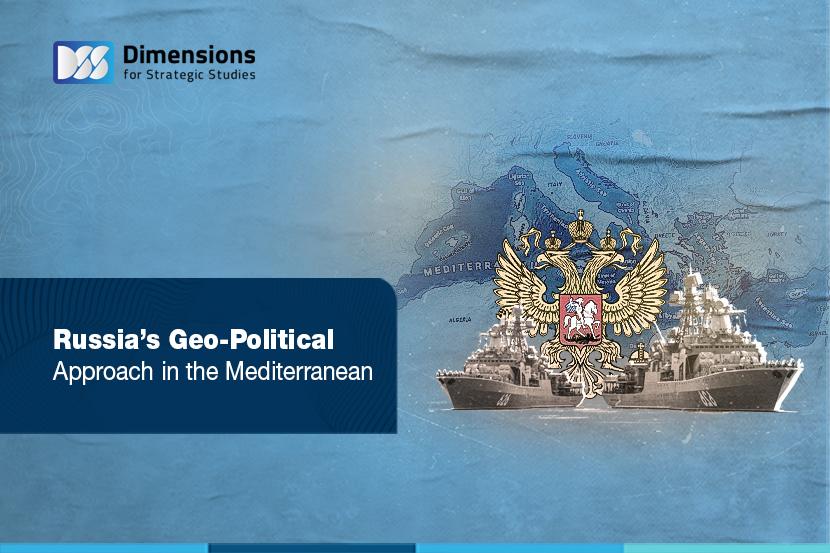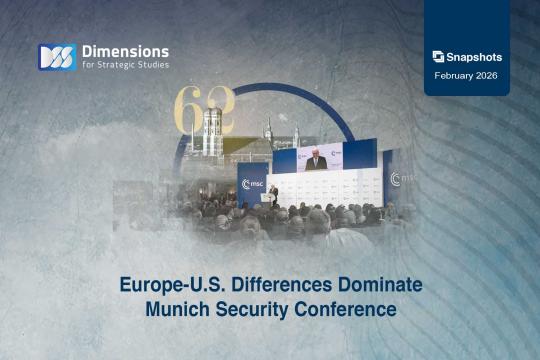
Russia’s Geo-Political Approach in the Mediterranean
2024-08-254381 view
Abstract
This paper examines Russia’s geopolitical approach in the Mediterranean region and the main motives for its presence there. These drivers are linked to Russia’s overall strategic priorities, most prominently its desire for access to warm-water harbors and waterways, along with the prize of a geographical foothold that serves Russian political, security and economic interests, enabling it to restore its international status and compete with the United States.
The essay pays particular attention to Russia’s presence in Syria and Libya, which are key manifestations of its geopolitical strategy in the region, then concludes by examining the challenges and obstacles to the Russian presence in the medium and long term.
Introduction
The Mediterranean region is of particular geopolitical importance to many actors, given its location and impact on international interactions. Its pertinence is heightened by the competing interests of many prominent regional and international powers and the continuous efforts of each to enhance its influence vis-à-vis its rivals there.
Russia’s contemporary approach to this region emerged in the early years of the 21st century. It has drawn particular attention from researchers on international affairs after Russia’s drive to establish a foothold in the region, notably following the Arab uprisings, which culminated in its presence in both Syria and Libya. This presence has enabled it to achieve its perennial dream of ensuring access to warm water harbors, and it has establishing military bases in the region—most prominently in Syria, which is at the heart of the Russian strategy in the Mediterranean basin.
This paper aims to shed light on Russia’s geopolitical approach in the Mediterranean. It provides a description of the Mediterranean’s geopolitical importance and the factors that make it a stage for competition between many powers, including Russia. The paper then discusses the main aspects and drivers of Russian policy in the Mediterranean by examining the most important geopolitical dimensions of Russian interests and their manifestations in the region, before concluding with an examination of the most important challenges and obstacles to Russian influence there.
Conclusion
Russian strategy in the Mediterranean is determined by the country’s resources and opportunities, and the Kremlin seeks to achieve privileges while denying them to its potential adversaries.
So far, this strategy has proven successful. A cursory examination reveals that many of the goals Russia had set itself in order to restore its influence in the Mediterranean have been achieved: it has established a presence in the strategic geography of the region, where many countries now view it has having increasing influence and competing with American power.
However, this strategy is not without its challenges and risks. Key among these is the woeful state of the Russian economy in light of American and European sanctions, especially after the Russian invasion of Ukraine. This may greatly limit Russia’s freedom of maneuver in the Mediterranean, and pose difficulties in the medium and long term as the Kremlin seeks to maintain its current level of engagement achieve its geopolitical ambitions in the region.
Therefore, the current dynamics in the Mediterranean point to political and economic developments that could change in highly unpredictable ways.
If Russia wants to maintain its geopolitical influence in the Mediterranean and further expand its penetration in order to outperform other global powers, it must prioritize maintaining close relations with the major countries in the region, while simultaneously strengthening its military, intelligence and economic relations with them. It must also be prepared to invest heavily in military, economic and political resources and in geostrategic transformations to tip the scales in the direction it plans.
To read this paper in full (in Arabic), click here.





